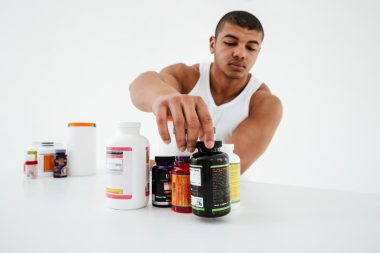Protein powders are everywhere! From the supplement store to the convenience store, in bags, canisters, and even pre-made shakes. There is no shortage of protein powder options available, and figuring out the best protein option can be flat out overwhelming. Marketing dominates the protein powder industry, and just because the packaging looks fancy and makes claims on the front of the label, it’s what’s on the back of the label, the Nutrition Facts that really matter.
But, how do you choose among the numerous protein powders you can find in stores and online? How do you know what to look for in a protein powder to ensure the ingredients on the back of the label will deliver on the claims made on the front?
Before we dive into how to pick the right protein powder, let’s start with why you might want to incorporate a quality protein powder into your health regimen in the first place. There are various reasons that a high-quality protein powder can have a positive impact on your health goals.
Meal Replacement:
A delicious, clean, protein powder can help you replace high calorie, low-nutrient meals as a meal replacement. This is especially true for those of us with busy schedules that often grab the quickest, easiest meal in sight. Typically when we do this we tend to lean on choices such as fast food, or sometimes even worse, skipping a meal completely. Having a high quality protein shake on hand will allow you to receive the important nutrients, vitamins and minerals your body craves and needs without slowing you down
The right protein shake can be used as a part of a detox or cleanse to rid your body of the unhealthy toxins that we eat, drink and breathe everyday. When our bodies are overloaded with toxins it can cause weight gain, joint pain, fatigue, and even effect the ways our bodies function.
Workout Recovery:
For the high impact athletes or the weekend warriors looking to stay in shape even as life’s stresses pile up, recovering from workout-to-workout is essential to maintaining peak performance. A clean, balanced protein powder following workouts can help your joints recover and replenish your body’s essential vitamins, minerals and nutrients so you’re ready to go the next time you step into the gym or onto the court, field, or track.
Now that we’ve established how protein powders can positively impact your health, we need to learn how to pick a protein powder that will deliver on its claims. It’s important to know that not all protein powders are created equal.
Many on the market are filled with sugar, use cheap forms of protein, and are loaded with all kinds of ingredients none of us can pronounce in that dreaded “other ingredients” section on the back of the label.
These are protein powders created by companies that specialize in marketing, not science and nutrition. They’ve found that a fancy label with outrageous claims, cheap ingredients to keep the price down and some slick marketing can sell a whole lot of protein, but is it really improving consumers’ health? Chances are the answer is, no.
To make sure you’re getting all the benefits a pharmaceutical grade, clinically proven protein powder can provide, here are 6 easy ways to hack a protein powder label and find one that is going to benefit your health goals.
Protein
Not all protein is created equal. Most protein shakes are made with either whey or soy protein, but for ideal performance it’s beneficial to look for a vegan protein powder made from sources such as brown rice or pea protein.
Additionally, the amount of protein is also critical. If you’re shake is touting protein, but then only contains 9g of protein per serving, what are you really drinking and does it really come with a benefit?
It is recommended to look for a vegan protein from clean sources that contains a minimum of 20g of protein per serving.
Sugar
Pay attention to the amount of sugar listed, as excess sugar and optimal health don’t mix. Most of the popular protein powders on the market are filled with sugar. This makes any benefit they provide almost completely moot. But, how much sugar should a quality protein powder contains?
Protein powders should have 5g or less of sugar per serving.
Sugar Alcohols
A trick of the trade in the food and health/wellness industry is to get around putting in sugar in their protein formula. To do this, many companies have protein powders that contain sugar alcohols. Sugar alcohols include ingredients such as xylitol, sorbitol, mannitol, and others. These are ingredients that should be avoided. Sugar alcohols are substitutes for artificial sweeteners such as aspartame and sucralose, but they are either poorly digested or poorly metabolized by your body.
Other Ingredients
Ever notice that section on the bottom of the label on your foods, drinks and supplements labeled “other ingredients”? That’s the section where manufacturers really get you. They stuff an entire list of ingredients that usually hard to pronounce, and those are often the ingredients you don’t want to put into your body.
With protein powders you always want to check the “other ingredients” listing and keep a keen eye out for the following ingredients: Maltodextrin (chemical sweetener), modified starches, thickening agents (xantham gum, guar gum, cellulose, etc.), carogeenan (a known carcinogen), soy lecithin, dextrin, artificial flavors. These ingredients should be avoided if health is a priority.
Transparency
This ties into the last point, but if you can’t sound out the words in an ingredients list, put it back on the shelf. Protein powders should be easy to read if they contain high quality and healthy ingredients.
Nutrients
Protein powders are highly convenient and can offer an array of benefits,if they provide key nutrients as well as protein. To get the most of your protein powder, look for one that provides a blend of vitamins, minerals, and macro- and micronutrients.
Next time you’re looking for a high quality protein powder, keep these 5 easy protein powder label hacks in your back pocket. Pull them out before you pull out your wallet and waste money on fancy marketing and not the powder you’re putting in your body.








Reply